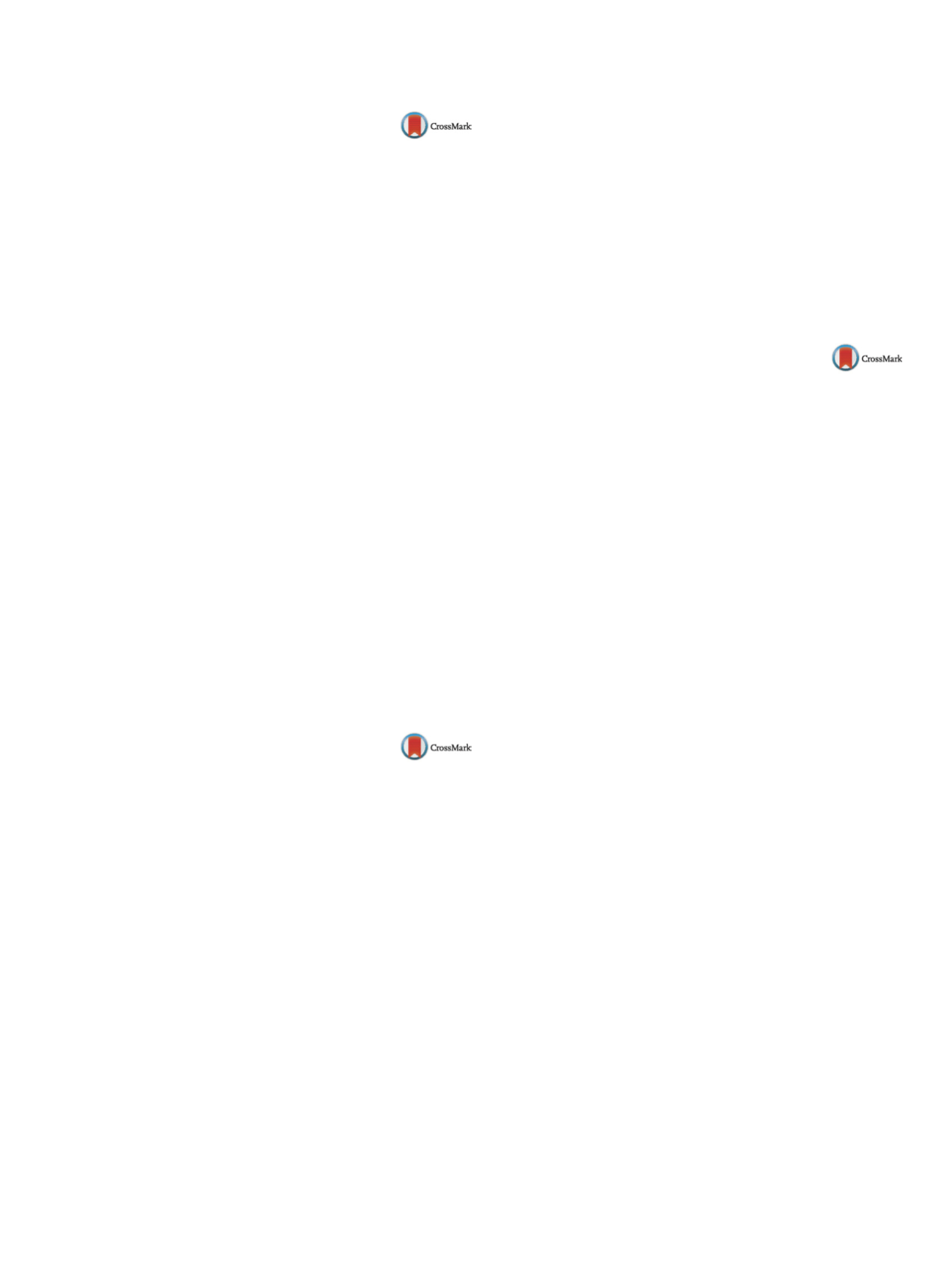

25th European Congress of Psychiatry / European Psychiatry 41S (2017) S303–S364
S323
EW0633
Duration of untreated illness and
outcome of obsessive-compulsive
disorder: A naturalistic follow-up
study
V. Prisco
∗
, F. Perris , T. Iannaccone , M. Fabrazzo , F. Catapano
University of Naples SUN, department of psychiatry, Naples, Italy
∗
Corresponding author.
Duration of untreated illness (DUI) is a predictor of outcome
in psychotic and affective disorders. Data available on DUI and
its relationship with outcome in obsessive-compulsive disorder
(OCD) suggest an association between longer DUI and poorer treat-
ment response. The present study investigated socio-demographic
and clinical predictors of DUI and its association with long-term
outcome in OCD patients. Eighty-three OCD outpatients were trea-
ted with serotonin reuptake inhibitors (SRIs) and prospectively
followed-up for 3 years. Baseline information was collected on
demographic and clinical characteristics using standard assess-
ments. Each patient was assessed through the structured clinical
interview for DSM-IV axis I disorders (SCID-I), the structured cli-
nical interview for DSM-IV axis II personality disorders (SCID-II),
the Yale-Brown obsessive–compulsive scale (Y-BOCS) and the 17-
item Hamilton rating scale for depression (HDRS). The DUI was
explored by interviewing patients, family caregivers and clinicians.
OCD subjects had a mean DUI of 7.3 (5.8) years. A younger age at
onset and a greater severity of OCD symptoms at baseline were
associated with a longer DUI. The DUI of patients with a “good out-
come” was shorter than that of patients with a “poor outcome”.
Logistic regression analysis revealed indeed a possible association
between longer DUI and “poor outcome”. In the logistic multi-
variable model, the association of DUI with treatment outcome
held true whilst controlling for socio-demographic and clinical
variables.
Disclosure of interest
The authors have not supplied their decla-
ration of competing interest.
http://dx.doi.org/10.1016/j.eurpsy.2017.02.247EW0634
Prevalence and clinical correlates of
sensory phenomena in obsessive
compulsive disorder
S. Rayappa
∗
, A. Hegde , J.C. Narayanaswamy , S.S. Arumugham ,
S. Bada Math , Y.C.J. Reddy
National institute of mental health and neurosciences NMHANS,
psychiartry, Bengaluru, India
∗
Corresponding author.
Introduction
A substantial number of patients suffering from
obsessive compulsive disorder (OCD) report a subjective distres-
sing experience prior to the repetitive behavior, known as sensory
phenomena(SP).
Objectives
Need to systematically evaluate SP and the clinical
correlates in OCD.
Aims
Assess prevalence of SP and clinical correlates in OCD.
Methods
Subjects (
n
= 71) fulfilling the criteria for DSM IV-TR
OCD were recruited consecutively from a specialty OCD clinic in
Southern India and were assessed using the Yale brown obsessive
and compulsive scale (YBOCS), dimensional Yale-Brown obsessive
compulsive scale (D-YBOCS) and the University of São Paulo Sen-
sory Phenomena Scale (USP-SPS).
Results
The prevalence of the SP was found to be 50.7%. Pre-
valence of SP is significantly greater in the patients with early
age of onset (
P
= 0.47). In subtypes of SP, Tactile was 12.7%, “just
right” for look was 26.8%, “just right” for sound was 9.9%, “just
right” for feeling was 16.9%, feeling of incompleteness leading
to repetitive behavior was 22.5%, “energy release” sensation lea-
ding to repetitive behavior was 4.2% and “urge only” leading
to repetitive behavior was 11.3%. SP was found to have signi-
ficant correlation with symmetry/ordering/arranging/counting
dimension (
P
= 0.003). Significant positive correlation existed
between SP severity and the severity of the compulsions
(
P
= 0.02).
Conclusion
Considering its high prevalence in OCD, it might be
useful to incorporate SP assessment during the routine clinical
assessment of OCD. It might warrant a place in the phenome-
nological and nosological description of OCD. Additionally, the
neurobiological correlates of SP need to be explored.
Disclosure of interest
The authors have not supplied their decla-
ration of competing interest.
http://dx.doi.org/10.1016/j.eurpsy.2017.02.248EW0635
Deep brain stimulation and anterior
capsulotomy: The question of
autonomy
S. Raymaekers
1 ,∗
, Z. Van Duppen
2, K. Demyttenaere
1, L. Luyten
3,
L. Gabriels
2, B. Nuttin
4, C. Bervoets
21
KU Leuven, psychiatry, Leuven, Belgium
2
UPC KU Leuven, psychiatry, Leuven, Belgium
3
KU Leuven, centre for psychology of learning and experimental
psychopathology, Leuven, Belgium
4
KU Leuven, neurosurgery, Leuven, Belgium
∗
Corresponding author.
Introduction
In carefully selected treatment-refractory patients
with obsessive compulsive disorder (OCD), deep brain stimulation
(DBS) or anterior capsulotomy (AC) might be considered as a pos-
sible treatment. However, the direct intervention in the brain can
raise questions about autonomy. Dopatients still feel like they are in
control of their actions when their behavior is changed by a surgical
intervention?
Objective/aims
To examine in both AC and DBS patients whether
these intervention influenced perception of autonomy. We aimed
to discover any differences in these perceptions when comparing
AC and DBS patients.
Methods
We conducted semi-structured interviews with AC and
DBS patients. Interviews were recorded digitally and transcribed
verbatim. We analyzed interviews in an iterative process based on
grounded theory principles.
Results
We interviewed 10 DBS patients and 6 AC patients.
Sense of agency (the awareness that one is the author of his/her
own actions) did not seem to be diminished by AC or DBS.
However, especially DBS patients are aware of their depen-
dency on a device for their well-being. Another important theme
is authenticity (in how far patients perceive their actions and
thoughts as matching their self-concept). Feelings of authenti-
city can be disturbed especially in cases of induced hypomania
(for DBS) or apathy (for AC). OCD itself also has an impact on
autonomy as patients describe a lack of freedom due to their
disorder.
Conclusion
Despite extensive changes in emotions, behavior and
even personal identity after DBS or AC surgery, perceived autonomy
was not greatly altered in these OCD patients.
Disclosure of interest
Medtronic provided grants for research,
education, and traveling to B. Nuttin and L. Gabriëls, who hold
the Medtronic Chair for Stereotactic Neurosurgery in Psychiatric
Disorders at KU Leuven. S. Raymaekers is supported by this Chair.
B. Nuttin co-owns a patent on DBS in OCD.
http://dx.doi.org/10.1016/j.eurpsy.2017.02.249

















